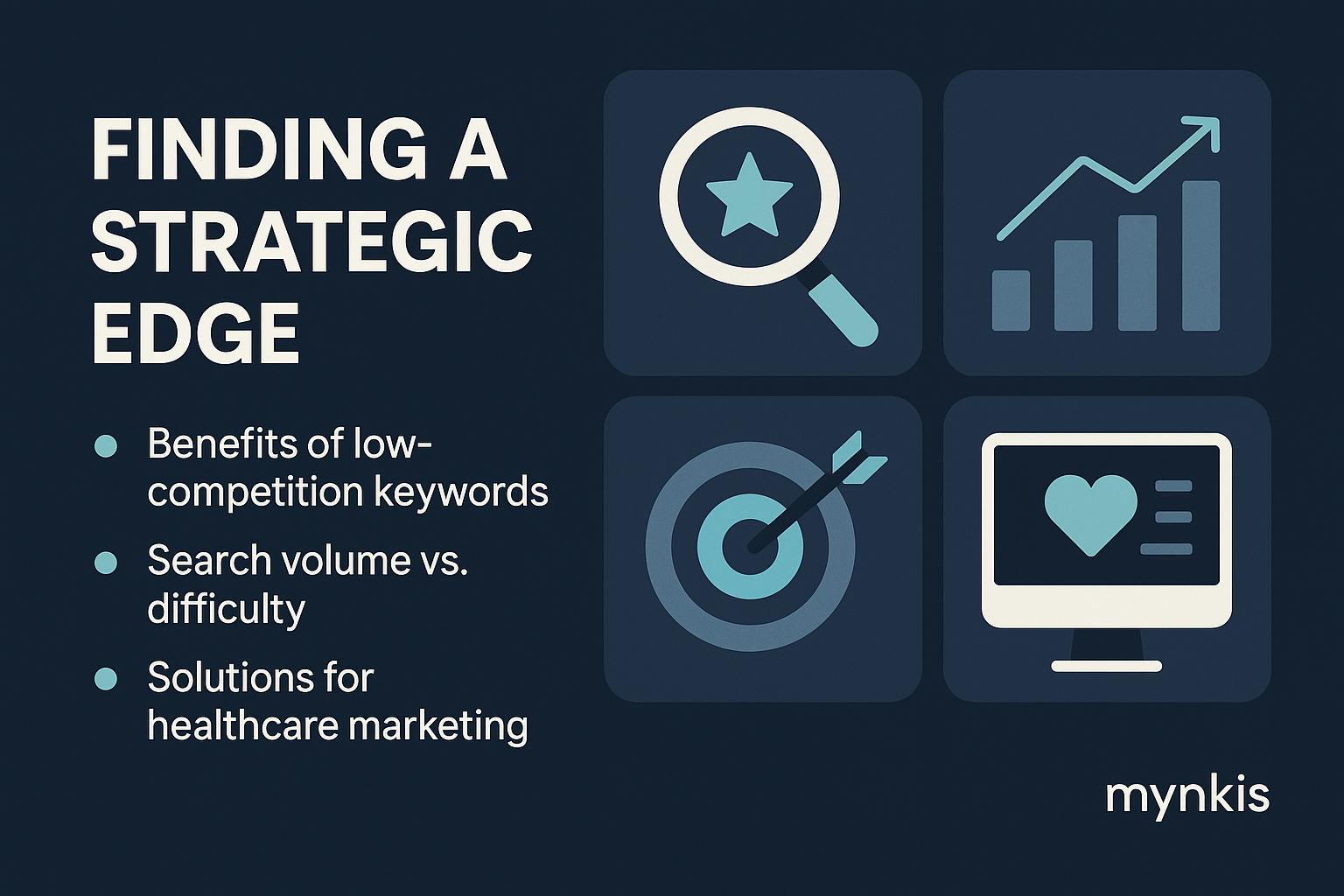Schedule a Demo
In my work with healthcare providers, I've seen how crucial it is to stay ahead in the digital landscape, especially for those managing patient data securely and efficiently. Diving straight into digital strategies, one often overlooked but highly effective approach is leveraging low competition keywords. These niche terms can give clinics and hospitals an upper hand in search engine optimization (SEO), increasing their visibility and attracting targeted traffic with less effort.
Low competition keywords are search terms with fewer companies or sites vying for them. They offer a unique opportunity to stand out in the healthcare sector. For instance, instead of targeting generic terms like "healthcare software," more specific keywords such as "HIPAA compliant patient portals" could be more effective. These terms are less competitive and cater directly to the needs of your target audience.
Incorporating these keywords can transform your website's and software's presence. By focusing on areas where the competition isn't saturated, clinics and hospitals can attract the right audience more efficiently. I've worked with healthcare IT leaders, and we've seen impressive results from this approach, optimizing not just for visibility but for relevance too.
To identify effective low competition keywords, start with keyword research tools like Google Keyword Planner or SEMrush. These platforms can provide insights into search volume, competition level, and related terms, which are crucial for tailoring your strategy. Look for terms that align closely with your services—keywords like "secure medical data software" or "custom EHR solutions" could be perfect, depending on your offerings.
Additionally, consider using long-tail keywords that are more specific and less competitive. Terms such as "compliance software for hospitals" or "telemedicine software with high security" can be less contested by your peers. This level of specificity often matches user intent more closely, increasing the chances of conversion once those users land on your site.
Once you've identified the right low competition keywords, the next step is integration. Incorporating these keywords into your website's metadata, page titles, and content will naturally boost your SEO. In my experience, a balanced approach is key—use keywords strategically to inform and engage your audience, not to overwhelm them.
This means optimizing your patient portal or data management software pages with keywords that speak to the specific needs and pain points of your clinic or hospital. For example, a page focused on a secure patient portal might include key phrases like "encrypted patient access" or "secure EHR integration." This approach not only improves SEO but ensures your offerings meet your audience where it matters most.
Low competition keywords offer several benefits in the context of custom software development and enterprise web solutions for healthcare. Firstly, they allow you to capture highly targeted traffic that is looking for what you specifically offer. This precision targeting can lead to higher conversion rates as the users coming to your site have a closer match to your service offering.
Secondly, using low competition keywords can result in faster gains in search rankings. In fields like healthcare, where digital competition can be intense, this advantage allows smaller clinics or specialized service providers to scale their online presence more rapidly. Based on available research, these quick wins can be pivotal for business growth, although individual results may vary depending on your specific niche and market conditions.
Thirdly, and perhaps most importantly for healthcare providers, these keywords can enhance your online reputation. With digital trust at a premium, establishing authority on less competitive yet still relevant topics like "digital health compliance solutions" can differentiate you from competitors who might not be as nuanced in their digital content.
In my consultancy, I've seen various clinics and hospitals implement low competition keywords with great success. One case involved a small clinic specializing in telemedicine. By targeting "secure telemedicine software," they managed to dramatically increase their online presence within a quarter, reaching new patients in need of remote medical services.
Another example involves a hospital that focused on "patient data security software." Not only did they climb the search engine rankings, but they also positioned themselves as experts in data protection—a crucial attribute for trust-building in healthcare today. These cases illustrate the practical benefits of strategic keyword use, reflecting the insights gathered from healthcare SEO leaders like Moz and Search Engine Journal.
The digital world is ever-evolving, which means that SEO strategies also need continuous monitoring and adaptation. Regularly analyze the performance of your keywords to see how they're affecting your traffic and engagement. Tools like Google Analytics can offer detailed insights into keyword effectiveness, allowing for ongoing optimization.
It's not just about implementing; it's about evolving with your audience's needs. If you notice certain terms or phrases losing effectiveness, it's time to pivot to newer, perhaps even less competitive keywords. This dynamic approach keeps your enterprise-level solutions ahead of the curve and more aligned with the evolving landscape of digital healthcare.
Looking ahead, the field of healthcare SEO will likely continue to grow in complexity and importance. Trends such as voice search optimization and mobile-first indexing will become increasingly relevant. Health institutions looking for custom software development and enterprise web solutions should consider how these trends interact with low competition keywords to stay at the forefront of the industry.
To remain competitive, consider investing in ongoing keyword research and user behavior analysis. While the current popularity of terms might change, the need for specific, secure, and efficient healthcare solutions remains constant. Balancing these emerging trends with time-tested SEO strategies will be key to sustaining and growing your online presence in the healthcare sector.
Remember, in the world of healthcare IT, relevance is king. Leveraging low competition keywords effectively positions your organization to meet the specific needs of your patients and other stakeholders, enhancing your digital strategy with less competition but no less impact.
